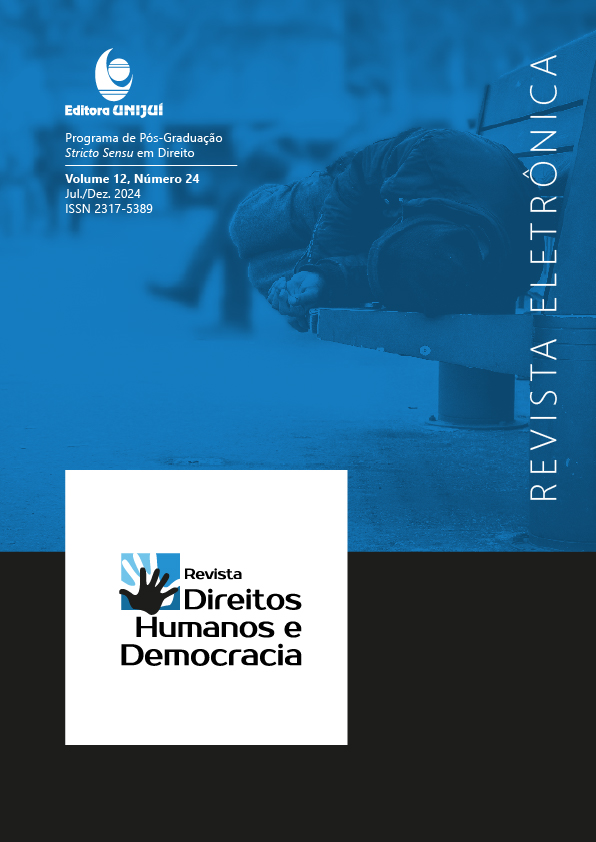The formation of a virtual public sphere and its influence on the decision-making process with global repercussions
DOI:
https://doi.org/10.21527/2317-5389.2024.24.15951Keywords:
Public sphere, Internet, Democratic participation, TransnationalizationAbstract
This article addresses the phenomenon of globalization and its consequences on the current political decision-making processes, considering the great influence of the decisions emanating from each autonomous state in an international basis. Based on this premise, a transnationalization of the public sphere, concept, initially developed by Jürgen Habermas, is suggested, in which the discussions held by citizens end up forming a public opinion on a given matter. That said, the analytical method is used, exercising a deductive reasoning based on the conclusions verified in the specialized bibliography to question the possibility of considering the internet as a globalized public sphere, in which the interactions of users allowed the formation of the public opinion theorized by Habermas. The analysis allowed us to conclude that, although the influence of the internet on the formation of a global public opinion is undeniable, limitations such as the absence of universality, full accessibility, and economic and political interferences prevent the virtual environment from being considered, in fact, a public sphere, as initially conceptualized by Habermas. Therefore, meanwhile its restrictions are not properly resolved, the internet can be used as a tool to complement the existing public sphere, with the potential to promote public engagement and democratic participation, playing a great role in the revitalization of democratic spaces.
References
BROWN, Garret Wallace; HELD, David. Editor’s introduction. In: BROWN, Garret Wallace; HELD, David (Org.). The cosmopolitanism reader. Cambridge: Polity, 2010.
FRASER, Nancy. Transnationalizing the public sphere: on the legitimacy and efficacy of public opinion in a post-westphalian world. Theory, culture & society, Los Angeles, v. 24, n. 4, p. 7-30, jul. 2007.
FUCHS, Christian. Social media end the public sphere. Triple C: communication, capitalism & critique, [s. l.], v. 12, n. 1, p. 57-101, fev. 2014. Disponível em: https://www.triple-c.at/index.php/tripleC/article/view/552. Acesso em: 09 jun. 2024.
GIMMLER, A. Deliberative democracy, the public sphere and the internet. Philosophy & social criticism, v. 27, n. 4, p.21–39, 2001.
GOMES, W. Esfera pública política e comunicação em Direito e Democracia de Jürgen Habermas. In: Gomes, W; Maia R. C. M. Comunicação e Democracia: problemas e perspectivas. São Paulo: Paulus, 2008.
HABERMAS, Jürgen. The structural transformation of the public sphere. 5. ed. Cambridge, Massachusetts: MIT Press, 1993.
HELD, David; MAFFETTONE, Pietro. Moral Cosmopolitanism and democratic values. Global policy, Durham, v. 8, n. 6, p. 54-64, 2017. Disponível em: https://doi.org/10.1111/1758-5899.12412. Acesso em: 27 jun. 2023.
INTERNATIONAL TELECOMMUNICATIONS UNION. Global connectivity report 2022. Genebra, 2022. Disponível em: https://www.itu.int/itu-d/reports/statistics/global-connectivity-report-2022/. Acesso em: 09 jun. 2024.
LEMOS, André. Nova esfera conversacional. In: MARQUES, Ângela et al. (Orgs.). Esfera pública, redes e jornalismo. Rio de Janeiro: E-papers, 2009.
MACKINNON, Rebecca. China’s censorship 2.0: how companies censor bloggers. First monday, [s. l.], v. 14, n. 2, fev. 2009. Disponível em: https://firstmonday.org/ojs/index.php/fm/article/view/2378. Acesso em: 09 jun. 2024.
MCMAHON, Liv. Quanto tempo irá demorar para o TikTok ser banido dos EUA? 7 questões para entender nova lei. BBC News Brasil, [s. l.], 24 abr. 2024. Disponível em: https://www.bbc.com/portuguese/articles/cw4d03nqqwyo. Acesso em: 09 jun. 2024.
MARQUES, F. P. J. A. Debates políticos na internet: a perspectiva da conversação civil. Opinião Pública, Campinas, v. 12, n.1, p. 164-187, 2006.
REHMAN, Ikhlaq ur. Facebook-Cambridge Analytica data harvesting: what you need to know. Library philosophy and practice, Lincoln, 2019. Disponível em: https://digitalcommons.unl.edu/libphilprac/2497/. Acesso em: 09 jun. 2024.
RIBAS, Carolline Leal; SILVA, Amaury. Redes sociais e esfera pública: a legitimação da participação política no cenário democrático brasileiro. Revista de direitos humanos e efetividade, Florianópolis, v. 6, n. 1, p. 23–42, 2020. Disponível em: http://dx.doi.org/10.26668/IndexLawJournals/2526-0022/2020.v6i1.6375. Acesso em: 27 jun. 2023.
SAMPAIO, Rafael Cardoso. BARROS, Chalini Torquato Gonçalves de. Internet como esfera pública? Análise de usos e repercussões reais das discussões virtuais. Cadernos PPG-AU/UFBA, [s. l.], v. 9, n.1, p. 161-183, 2011. Disponível em: https://periodicos.ufba.br/index.php/ppgau/article/view/5114. Acesso em: 01 jul. 2023.
SILVEIRA, S. A. Esfera pública interconetada, blogosfera e redes sociais. In: MARQUES, Ângela et al. (Orgs.). Esfera pública, redes e jornalismo. Rio de Janeiro: E-papers, 2009.
TERRA, Carolina Frazon; SOUSA, Gisela Maria Santos Ferreira de. Opinião pública em tempos de mídias sociais: midiatização, comunicação desintermediada e memes. In: Anais do 13º Congresso Brasileiro Científico de comunicação organizacional e de relações públicas. São Paulo, 2019. Disponível em: https://abrapcorp2.org.br/site/manager/arq/(cod2_22591)CarolTerra_GiselaSousa_GT6_Abrapcorp_2019.pdf. Acesso em: 27 jun. 2023.
Downloads
Published
How to Cite
Issue
Section
License
Copyright (c) 2024 Human Rights and Democracy Journal

This work is licensed under a Creative Commons Attribution 4.0 International License.
By publishing in the Revista Direitos Humanos e Democracia, authors agree to the following terms:
Articles are licensed under the Creative Commons Atribuição 4.0 Internacional (CC BY 4.0), which allows:
Share — copy and redistribute the material in any medium or format;
Adapt — remix, transform, and build upon the material for any purpose, including commercial use.
These permissions are irrevocable, provided the following terms are respected:
Attribution — authors must be properly credited, with a link to the license and indication of any modifications made;
No additional restrictions — no legal or technological measures may be applied that restrict the use permitted by the license.
Notices:
The license does not apply to elements in the public domain or covered by legal exceptions.
The license does not grant all rights required for specific uses (e.g., image rights, privacy, or moral rights).
The journal is not responsible for opinions expressed in the articles, which remain the sole responsibility of the authors. The Editor, with the support of the Editorial Committee, reserves the right to suggest or request modifications when necessary.
Only original scientific articles presenting research results of interest, not previously published or simultaneously submitted to another journal with the same purpose, will be accepted.
References to trademarks or specific products are intended solely for identification purposes and do not imply any promotional endorsement by the authors or the journal.
License Agreement: Authors retain copyright over their articles and grant the Revista Direitos Humanos e Democracia the right of first publication.













